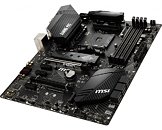- Joined
- Oct 9, 2007
- Messages
- 47,465 (7.50/day)
- Location
- Hyderabad, India
| System Name | RBMK-1000 |
|---|---|
| Processor | AMD Ryzen 7 5700G |
| Motherboard | ASUS ROG Strix B450-E Gaming |
| Cooling | DeepCool Gammax L240 V2 |
| Memory | 2x 8GB G.Skill Sniper X |
| Video Card(s) | Palit GeForce RTX 2080 SUPER GameRock |
| Storage | Western Digital Black NVMe 512GB |
| Display(s) | BenQ 1440p 60 Hz 27-inch |
| Case | Corsair Carbide 100R |
| Audio Device(s) | ASUS SupremeFX S1220A |
| Power Supply | Cooler Master MWE Gold 650W |
| Mouse | ASUS ROG Strix Impact |
| Keyboard | Gamdias Hermes E2 |
| Software | Windows 11 Pro |
Our Monday story chronicled how MSI inadvertently erred in giving many of its AMD 400-series chipset motherboards 128 Mbit (16-megabyte) SPI flash ROM chips instead of larger 256 Mbit (32-megabyte) ones, which nearly jeopardized the company's "Zen 2" support deployment, forcing it to greatly thin its motherboard firmware feature-set, and break SATA RAID support on many of its boards. To be fair to MSI, the company may not have anticipated the AGESA microcode growing tremendously in size with its latest ComboAM4 1.0.0.3-series. We are now hearing from Polish tech publication PurePC that MSI has scrambled to remedy this by re-releasing many of its AMD 400-series chipset motherboards with larger 256 Mbit SPI flash ROM chips.
The PurePC report states that MSI will brand the revised motherboards "MAX" in the product name (eg: B450 Gaming Pro Carbon AC MAX, B450M Bazooka MAX, etc.), although we don't know if the new model names will have the company's latest MEG/MPG/MAG prefixes. The 256 Mbit SPI flash ROM chip allows MSI to cram in AGESA 1.0.0.3a, which lets you use 3rd generation Ryzen processors to their full capabilities (barring PCIe gen 4.0 on these motherboards of course). More importantly, the larger ROM chip allows MSI to have AGESA 1.0.0.3a without sacrificing on its feature-rich Click BIOS 5 UEFI setup program, SATA RAID module, or losing support for any of the socket AM4 processors.

MSI is said to be working on variants of not just its B450 and X470 chipset motherboards, but also the entry-level A320 chipset. The company gambles that people may still try to pair "Picasso" APUs with the A320. Why AMD 400-series boards now, you ask? Because X570 motherboards start at $170, and enthusiasts may want to pair their brand new 3rd generation Ryzen processors with an AMD 400-series chipset motherboard, taking advantage of USB BIOS Flashback feature, instead. It won't be until early-2020 that AMD launches cheaper 500-series chipsets. Until then, sales of 400-series chipset motherboards are expected to rise, as more consumers pick up 3rd generation Ryzen processors.
View at TechPowerUp Main Site
The PurePC report states that MSI will brand the revised motherboards "MAX" in the product name (eg: B450 Gaming Pro Carbon AC MAX, B450M Bazooka MAX, etc.), although we don't know if the new model names will have the company's latest MEG/MPG/MAG prefixes. The 256 Mbit SPI flash ROM chip allows MSI to cram in AGESA 1.0.0.3a, which lets you use 3rd generation Ryzen processors to their full capabilities (barring PCIe gen 4.0 on these motherboards of course). More importantly, the larger ROM chip allows MSI to have AGESA 1.0.0.3a without sacrificing on its feature-rich Click BIOS 5 UEFI setup program, SATA RAID module, or losing support for any of the socket AM4 processors.

MSI is said to be working on variants of not just its B450 and X470 chipset motherboards, but also the entry-level A320 chipset. The company gambles that people may still try to pair "Picasso" APUs with the A320. Why AMD 400-series boards now, you ask? Because X570 motherboards start at $170, and enthusiasts may want to pair their brand new 3rd generation Ryzen processors with an AMD 400-series chipset motherboard, taking advantage of USB BIOS Flashback feature, instead. It won't be until early-2020 that AMD launches cheaper 500-series chipsets. Until then, sales of 400-series chipset motherboards are expected to rise, as more consumers pick up 3rd generation Ryzen processors.
View at TechPowerUp Main Site







 Thank you Sherlock
Thank you Sherlock